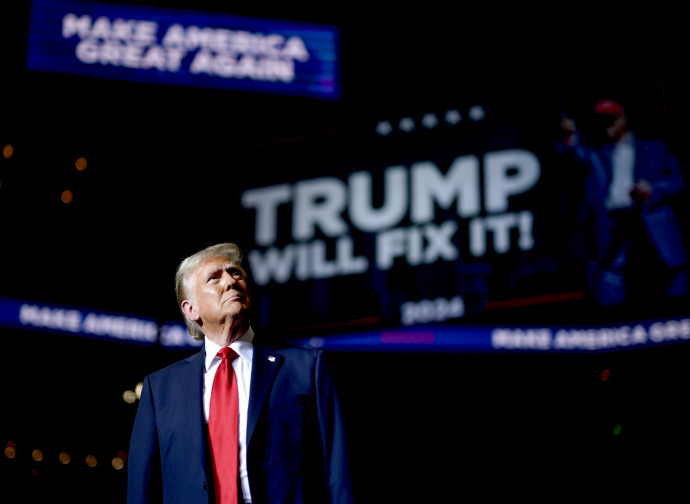With Trump, Americanism may soften in the US and move to Europe
What remains of the condemnation that the Church under Leo XIII made of Americanism understood as a doctrine of the primacy of efficientism over contemplative life? Trump's victory could lead to a revision of Americanism in liberal style, which will take root more and more in Europe and... in the Vatican.

On 22 January 1899, Leo XIII published his encyclical Testem benevolentiae condemning Americanism. It would be interesting to assess the relevance of what the Church taught at that time with the situation that has opened up after the election of Donald Trump to the presidency of the United States. Will the new political framework remain within Americanism or will it break away from it?
The term Americanism indicates efficiencyism, pragmatism, the celebration of active life versus contemplative life, the exaltation of ‘active’ virtues, the natural ones, over ‘passive’ virtues, the supernatural ones, which are the consequences of Protestantism. One could say that a certain Americanism was born not in America but in Europe, if Max Weber's observations in The Protestant Ethic and the Spirit of Capitalism are true or, to be more cautious, that Americanism is a derivation from European cultural matrices. One thing is certain: Americanism, although American in origin, is not closed within the confines of the United States, nor can it be thought to cover the whole of American society. There is Americanism outside the US and there are realities not conditioned by Americanism within the US.
Americanism is not only a political doctrine and does not only cover social aspects. It presupposes a theological revolution and thus also has consequences for the Church involving breaking the relationship between nature and grace. The natural virtues would be preferable to the supernatural ones and, therefore, not only would nature be able to do its own thing, but it would emerge in the foreground compared to the supernatural. ‘It is a difficult thing to understand,’ wrote Leo XIII, ’how Christian men can put natural virtues before the supernatural ones, and attribute greater efficacy and fruitfulness to the former. Does this mean then, that nature, aided by grace, will become weaker, than if it were left to its own strength?’
‘It is not easy to understand,’ says Leo XIII, ‘because there are no “passive” virtues, nor are the so-called “active” virtues self-determinations of the person. Such, the Pope exemplifies, the virtues following the assumption by religious of the evangelical counsels as well as the precepts are not active virtues. Nor must priests give themselves over to practical activities of a sociological nature, but they must fulfil their task ‘by an enlightened fulfilment of their preaching ministry, by the pomp and splendour of ceremonies especially by setting forth that sound form of doctrine which Saint Paul inculcated upon Titus and Timothy’. Americanism, in other words, would also be at the origin of street priests, of worker priests, of social priests who often put the active virtues of social solidarity before the contemplative virtues conformed by grace.
Augusto Del Noce, an Italian philosopher, drew a distinction between the West and Europe precisely on this basis, believing that while the latter envisages a contemplative culture, the American culture envisages an efficientist and pragmatic one. Americanism would thus be an indigenous American production and not a derivation from intellectual and moral viruses from the old continent. This thesis is of considerable interest but not fully convincing because Europe is not just one, but two: the authentic one Del Noce has in mind and the false one born in the modern age from a revolution in philosophical and political thought. With the latter, Americanism has non-secondary connections.
Now, can Trump's electoral victory suggest a revision of Americanism? It can be expected that liberal Americanism will suffer a slowdown and an internal struggle will develop, which, however, will not mean an exit from the Americanism to which, after all, Trump also seems to refer. It will be a matter of seeing how far his concrete policies will be based only on efficiencyist criteria - think of health care or immigration or, even, the positioning regarding the ongoing wars - or how far they will also be loaded with cultural and moral values, succeeding in opening up some gaps in the general framework of Americanism.
In reality, the liberal Americanism of Clinton, Obama, Biden, pretending to celebrate active virtues, imposed a very rigid passivity on American citizens with respect to the ideological visions of the prevailing neo-globalism. It would already be a good thing if the Trump government were to create a few cracks and dismantle a few pieces into which the healthy forces of American society could insert themselves. There are social forces in the USA that are free of Americanism. The no to state abortion decreed by the citizens of Nebraska proves this. Even in the Catholic Church there are living forces that have so far shunned Americanism, including some bishops like Cordileone or Strickland.
Americanism is after all an ideology that America feels obliged to make universal like a new religion, but a few good doses of realism might reduce its prosopopoeia.
But the real news of the Trump era might be another, namely that while America revises the Americanist ideology, without abandoning it altogether, Americanism continues in Europe and the Vatican. In Europe it might continue in the form of a new Europeanism in the sense of the ‘great choices’ called for by Mario Draghi, in the Vatican continuing along the road already widely taken of a Catholic faith proposed as a praxis of social integration, in the privileging of virtues considered active to the detriment of passive ones.
Trump's America: interclass, interethnic and anti-ideology
‘Trumpism’ is not so much a populism, as often derogatorily described by its enemies, but a ‘people's party’ that expresses the new economic, social and cultural balances in the United States that have matured in recent decades.
